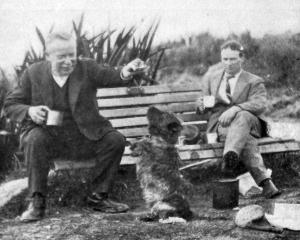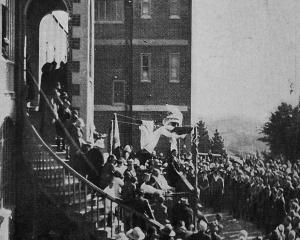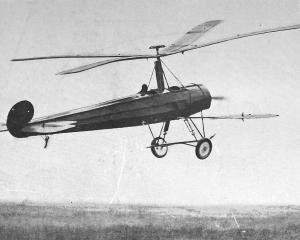Its conclusion and the ushering in of the new year 1915 were marked by the ceremonials customary upon such occasions, and on Thursday evening the streets of the city were thronged by dense crowds.
The chief object of some of those abroad seemed to be the creation of as much noise as possible, and the general uproar that was produced was nothing short of wonderful.
However, the crowds were remarkably orderly, and everything was done with the best of intentions - even to the throwing about of a particularly noisy little explosive, known as a ''Russian bomb'', which explodes on any slight concussion.
For several hours the streets were crowded and the shops plied a brisk trade, and as 12 o'clock approached the night was rendered doubly hideous by an accentuation of the noise. As the fateful hour struck bells were rung, whistles sounded, and bagpipers skirled, while from all points of the city rockets rose gracefully skyward, and on reaching their maximum height an invisible hand seemed to scatter a cluster of sparks into the night.
Despite the noise and the uproar there was at the back of every mind - no matter how careless or centred upon present enjoyment - a niche in which some thought of the great struggle in Europe found a place, and Tennyson's words, written also upon the threshold of a New Year, must have been the silent, yet eloquent, prayer of many a heart: ''Ring out the thousand wars of old, ring in the thousand years of peace.''
GISBORNE: About 9 o'clock on New Year's Eve a number of young men made a demonstration outside the shop of Mr F. Wohnsiedler, a naturalised German, who conducts a pork butchery.
Well-aimed stones smashed a big plateglass window. The crowd gradually increased in numbers, and stones became more frequent until all the local police were called out to keep the mob in order, and Mr Wohnsiedler closed his premises and extinguished all the lights.
By midnight there were fully 2000 people surging round the shop, singing patriotic songs, and the police had an unenviable time, there being several ugly rushes.
In various parts of the Commonwealth and of the dominion, boroughs and municipalities are busy changing the names of their towns and streets wherever they have a Germanic sound.
This can be done with a minimum of expense and at no subsequent loss to the ratepayers, but it is an altogether different matter when an old-established commercial concern voluntarily relinquishes its title in sympathy with the wave of national sentiment that pervades the Empire.
The position achieved by the Dresden Piano Company during its honourable career of over 32 years has been materially aided by the felicitous title chosen at the start, and the company is now undoubtedly parting with a very valuable asset in following the example of the boroughs and municipalities, and changing its name to The Bristol Piano Company, Limited.
This sacrifice will, we believe, be much appreciated by the public of New Zealand. - ODT, 2.1.1915.











